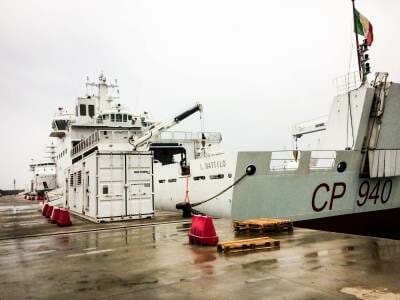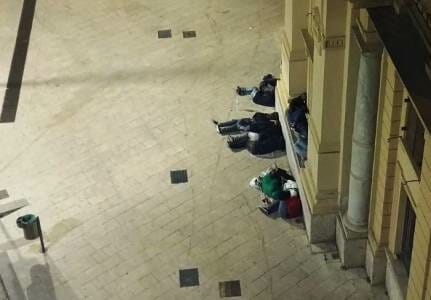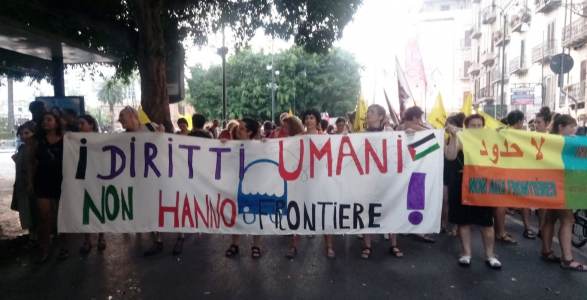A week of protests in the Province of Caltanissetta
It has been a week of intense protests in several reception centres in the province of Caltanissetta. On January 13, about fifty residents of the CAS* which is located inside the Public Institute for Assistance and Charity of Pagano (where about 150 asylum seekers are living at the moment) protested against the intolerably long waiting time for being convoked by the local commission for the recognition of international protection. In order to gain visibility for their protests and for obtaining an answer, they put their mattresses outside the centre and began a hunger strike. The asylum seekers in question are of Pakistani origins who arrived at the centre last March – it has been since then that they are waiting for the convening of the hearing by the local commission.
The day after the start of the protest the mayor of San Cataldo himself went together with a delegation of the protesting group to the prefecture of Caltanissetta in order to urgently request an answer. In this way, the delegation obtained a meeting with the president of the commission (assistant vice-prefect of the Caltanissetta prefecture), who assured them that the commission would meet the upcoming days in order to examine their documentation. http://www.ilfattonisseno.it/2015/01/san-cataldo-conclusa-la-protesta-degli-ospiti-dellipab-a-giorni-e-previsto-che-si-riunira-la-commissione-territoriale/
In this regard we remind that it is common practice for the local commission of Caltanissetta to request the production of the documentation within two weeks before the convening. Also some of the persons in charge of certain CAS told us that they had been asked for a collaboration on this matter (http://www.siciliamigranti.blogspot.it/2014/12/caltanissetta-visita-ad-uno-dei-cas-di.html). Therefore, it is probably the case that “to examine the complete documentation” actually refers to the examination of the evidentiary documents previously sent to the commission.
This procedure, which appears ambiguous and is not foreseen by law, is intended to accelerate the timing of interviews and, generally, the waiting time for hearings. However, we continue to gather stories from people whose hearings lasted up to 8 hours and who later on have been recalled for other 3-4 hours.
On the same day of the protests in San Cataldo another protest erupted in town. Some asylum seekers residing at the centre expressed their exasperation for the commission’s waiting time and blocked the highway in front of the reception centre. http://www.lagazzettanissena.it/pian-del-lago-protesta-di-ospiti-cittadini-del-gambia/
In December, instead, there was a loud protest by some guests of the CAS located in town, where about 60 asylum seekers are accommodated. http://www.ilfattonisseno.it/2014/12/caltanissetta-via-niscemi-nigeriani-che-protestano-bloccando-il-traffico/
Besides, a further kind of discontent is noticeable in the province. Some asylum seekers claim that the convening would not respect the order of protocol numbers given to asylum requests and affirm that some residents accommodated by certain CAS of the province (of whom they have direct knowledge of) would be convened with more priority compared to those who are accommodated in other centres. The protocol number of asylum requests is the only objective figure which confirms the claim, while it still holds true that the order of the list can vary in relation to the availability of interpreters.
The long waiting times for convening, which for some commissions exceed 14 months, represent one of the main problems of the asylum system in Italy. It is a pending time that many of the persons in question are condemned to experience passively in first reception centres, which depersonalize and offend human dignity, because they do not offer any means for the future.
In this regard we ought to talk about the tragic condition of thousands of asylum seekers who manage to be integrated into SPRAR** projects after spending months in different CAS located in remote areas of Italian provinces, thus personally paying the price of the organization of the asylum reception system. Indeed, the transfer usually occurs between different provinces, often from north to south and vice versa, and it happens, that by moving to another province changes also the local commission in charge. Consequently, the many months spent waiting in a CAS do not count any more – the time is reset and it all goes back to the drawing-board.
Giovanna Vaccaro
Borderline Sicilia
Translation: Chiara Guccione
*CAS: Centro di accoglienza straordinaria: extraordinary reception centre
**SPRAR: Sistema di protezione per rifugiati e richiedenti asilo: system of protection for refugees and asylum seekers




